The State of The Rivers/Oceans/Water/Air
- Richprins
- Committee Member
- Posts: 74882
- Joined: Sat May 19, 2012 3:52 pm
- Location: NELSPRUIT
- Contact:
Re: The State of The Rivers/Oceans/Water
Interesting! 
Please check Needs Attention pre-booking: https://africawild-forum.com/viewtopic.php?f=322&t=596
- Lisbeth
- Site Admin
- Posts: 65368
- Joined: Sat May 19, 2012 12:31 pm
- Country: Switzerland
- Location: Lugano
- Contact:
Re: The State of The Rivers/Oceans/Water
KZN SEWAGE CRISIS, PART ONE
Criminal charges laid against Durban municipality as pressure mounts for probe and action on polluted waters
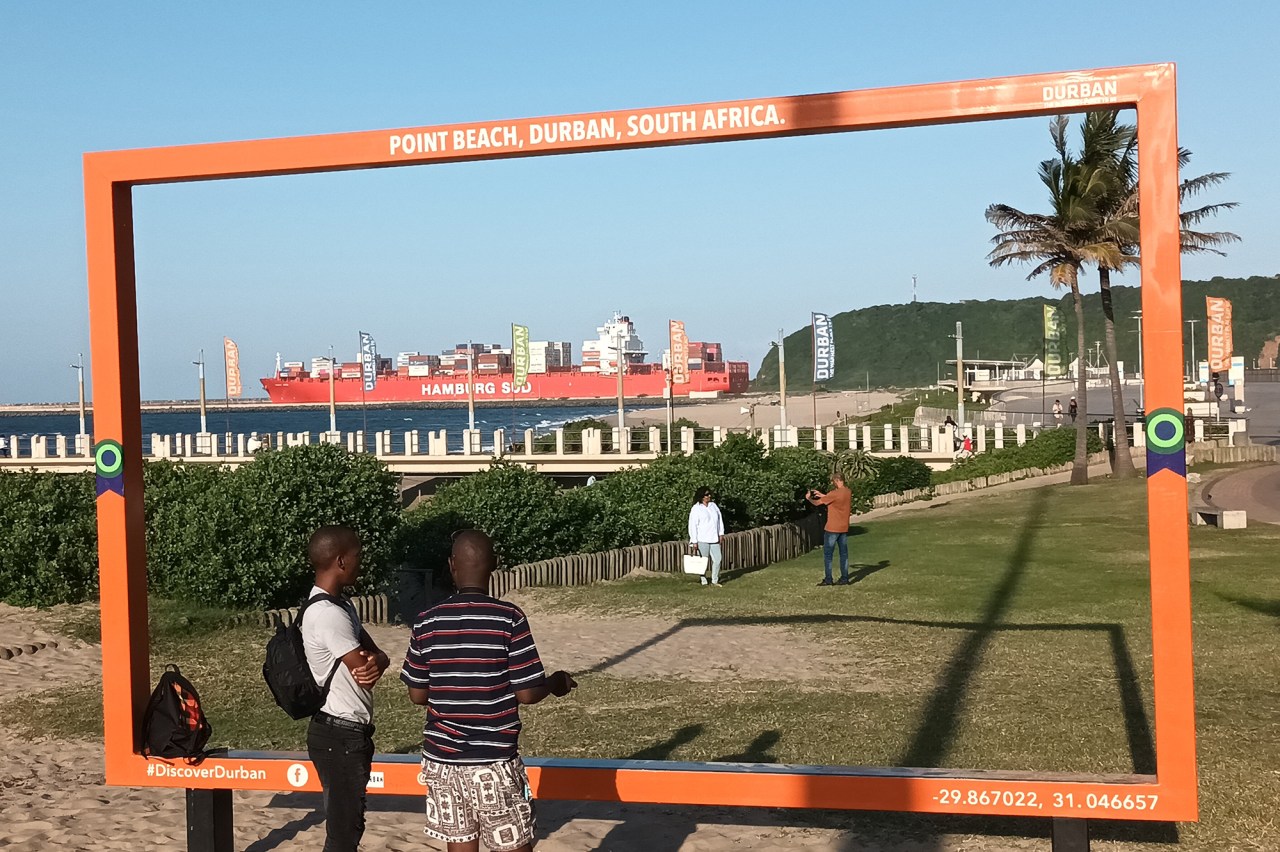
Durban’s beaches remain in the spotlight for all the wrong reasons, with legal pressure piling up on the city to plug the flow of untreated sewage. (Photo: Tony Carnie)
By Tony Carnie | 20 Nov 2022
A civil case was lodged in the Durban High Court last week (16 November) against eThekwini, four Cabinet ministers and several government departments by ActionSA, which is calling for an independent investigation — and an urgent rehabilitation plan — following the lengthy delay in repairing the city’s wastewater treatment infrastructure after the April/May floods and alleged city mismanagement that predates the flood damage.
The Democratic Alliance has indicated that it plans to launch similar legal action if the city fails to respond to a recent letter of demand, with DA provincial chair Dean Macpherson suggesting the party could subpoena eThekwini Mayor Mxolisi Kaunda and two national government ministers to account for the failure to enforce water and environmental conservation laws.
Now it has emerged that at least three criminal charges have also been laid against senior eThekwini officials by the KwaZulu-Natal provincial Department of Environment Affairs for the city’s alleged contravention of environmental pollution laws.
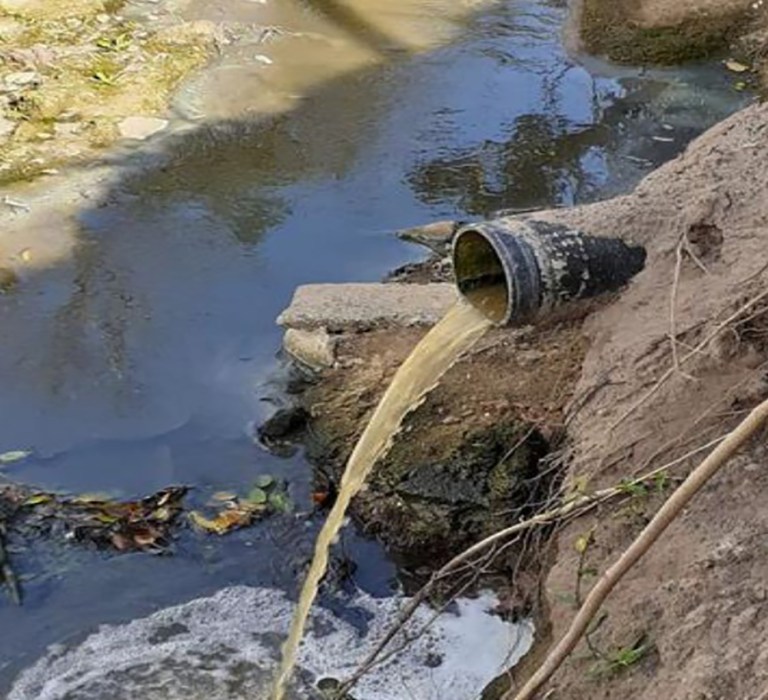
Sewage flows into a river in the Pinetown area. (Photo: EDTEA)
The charges came to light during the ninth Environmental Compliance and Enforcement Lekgotla (meeting) of the Green Scorpions in Muldersdrift, Gauteng, last week.
Dr BR “Zakhele” Dlamini, senior director (environmental management) of the KwaZulu-Natal Department of Economic Development, Tourism and Environmental Affairs, told the lekgotla that his department had served more than 30 administrative action directives on the city between 18 May and 30 August.
The directives were intended to remedy sewage flows into rivers and the sea and the subsequent closure of several beaches that had left the tourism industry “in turmoil”.
Dlamini said his department had taken water quality samples and handed over three criminal investigation dockets to the National Prosecuting Authority for pollution of the environment: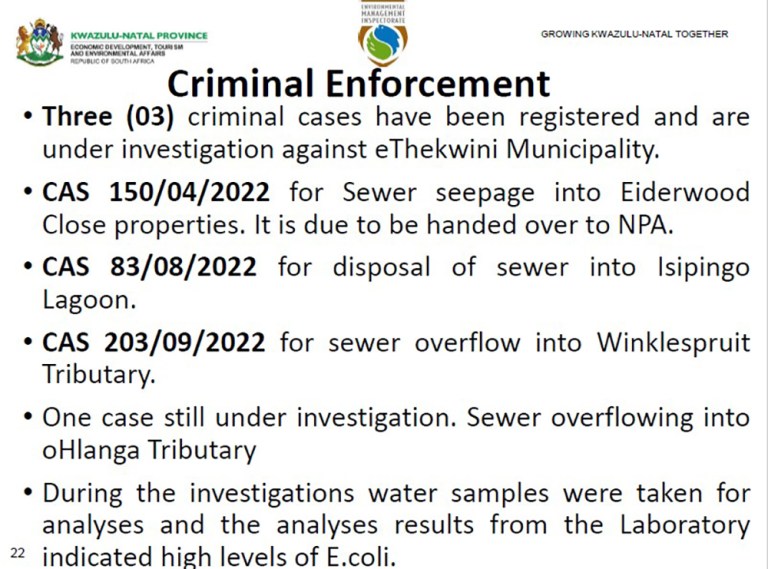
The three criminal charges against the Ethekwini municipality. (Image: Supplied)
In a separate presentation to the provincial legislature’s portfolio committee on environmental affairs on 1 November, Dlamini outlined the lengthy process his department had followed before taking the final step of laying charges against a fellow government department.
He suggested that in terms of Chapter 3 of the Constitution and the Intergovernmental Relations Framework Act, there was a duty to avoid legal proceedings against fellow organs of state and a need to “foster friendly relations, assist and support one another as organs of state”.
However, he said, legal proceedings did not preclude administrative enforcement measures by his department.
“While there is, therefore, no prohibition against issuing an administrative notice against an organ of state, acting in the spirit of co-operative governance dictates a less confrontational approach in dealing with non-compliant organs of state.”
But, he stated, in red text: “It is key to note that the Constitution does not prohibit legal proceedings between organs of state, but places a duty on organs of state to avoid such proceedings against each other.”
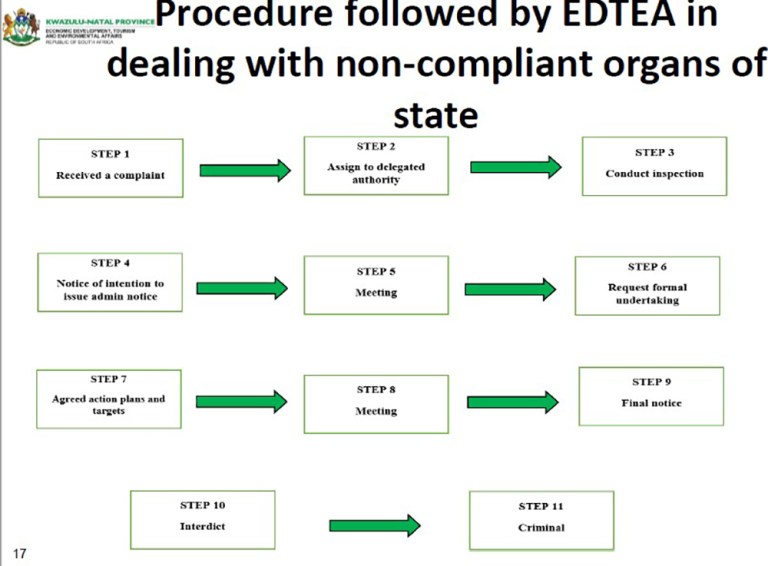
The Department of Water and Sanitation seems to have been following a similar procedure in trying to compel the city to remediate the sewage spills into rivers.
In its presentation to the portfolio committee, the department confirmed that it had issued a series of non-compliance notices to eThekwini Municipality in terms of the National Water Act over recent months. In response, representations from eThekwini were received on 13 July. The department reviewed these and indicated to the city that its action plan was “unsatisfactory” and that repair timelines had not been adhered to.
Noting that sewage flows into “most” city wastewater treatment works were still low (as of 1 November), the national Department of Water and Sanitation said that “work done to date on the sewerage infrastructure is not satisfactory” and that several rivers were still polluted with high levels of E. coli bacteria.
Now ActionSA has lodged a legal application in the Durban High Court in which the party’s provincial chair, Zwakele Mncwango, slams the city’s “lackadaisical approach” to resolving the pollution crisis.
“Whilst it is tragic that the public must approach the courts to [compel] the executive to act upon their obligations, which are clearly legislated, the public has no alternative remedy at this stage.”
Mncwango said the negative publicity surrounding the city’s polluted beaches had been “devastating” for the local tourism industry. It had also led to the cancellation of several ocean sports events, and some lifeguards and other municipal staff had expressed fears for their health following the recent reopening of several beaches.
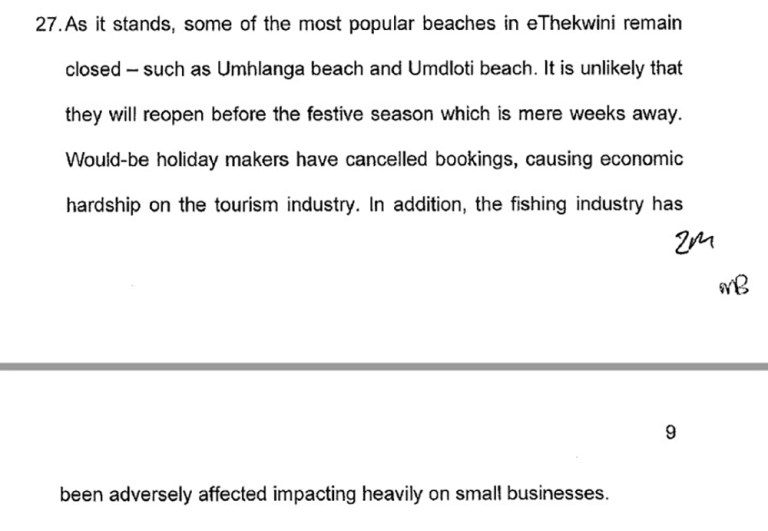
ActionSA affidavit. (Image: Supplied)
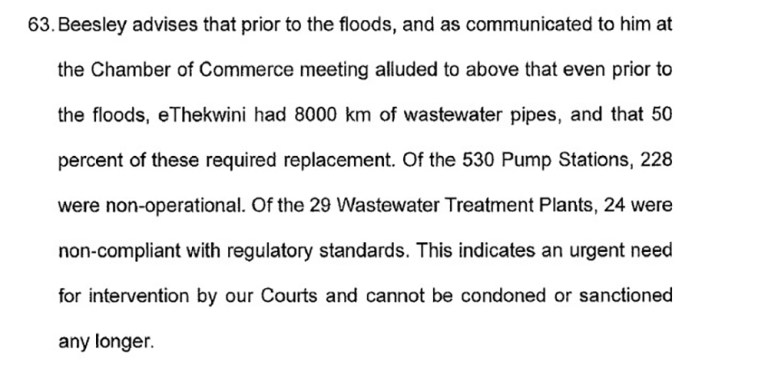
ActionSA affidavit. (Image: Supplied)
Apart from the eThekwini Municipality and Mayor Kaunda, the party has cited six other respondents in the court action: Tourism Minister Lindiwe Sisulu, Water and Sanitation Minister Senzo Mchunu, Environment Minister Barbara Creecy, Co-operative Governance and Traditional Affairs (Cogta) Minister Nkosazana Dlamini Zuma, Cogta MEC Sihle Zikalala and Environment MEC Siboniso Duma.
All have 15 days to indicate whether they wish to oppose the application and a further 15 days thereafter to file responding papers if they choose to oppose the suit.
However, it appears that a court hearing is unlikely until 27 February at the earliest, depending on whether the city and other respondents oppose the court action.
Mncwango says his party seeks an order declaring the conduct of the eight government respondents to be in contravention of the National Environmental Management: Waste Act 59 of 2008 which aims to “protect health and the environment by providing reasonable measures for the prevention of pollution and ecological degradation”.
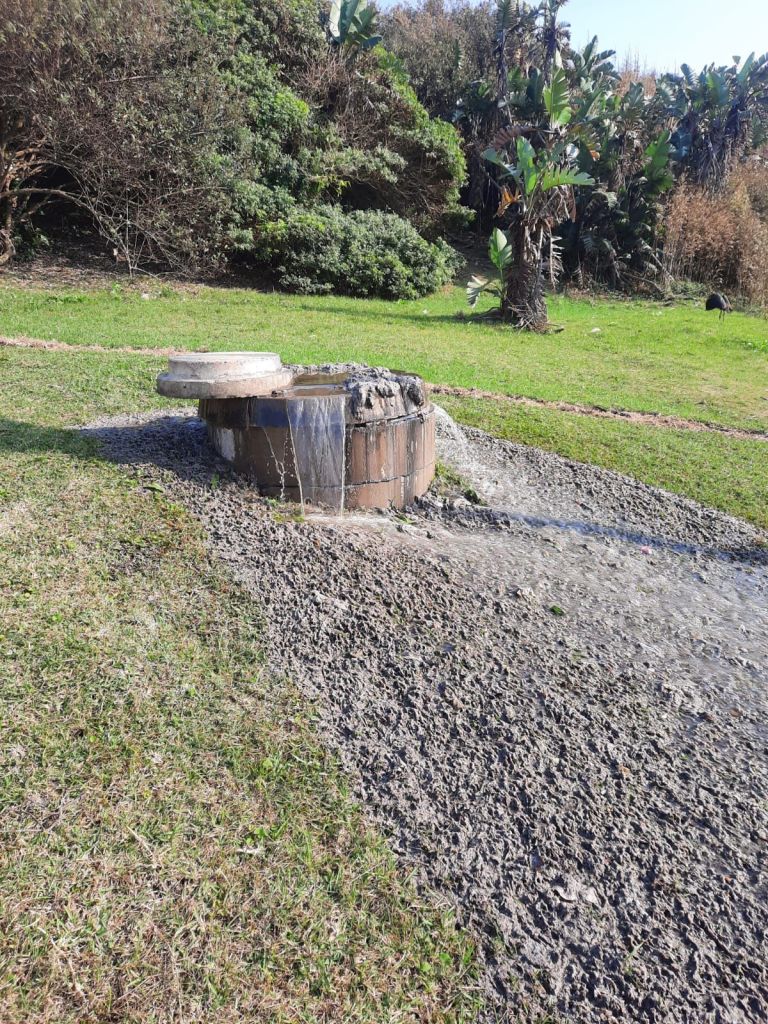
Sewage pours from a sewer line near Westbrook beach, north of Durban, on 22 September. (Photo: Supplied)
The party says it also seeks to enforce provisions of the Constitution guaranteeing people’s right to dignity and to an environment which is not harmful to their health or wellbeing.
Referring to a 31-page “storm recovery” plan prepared by the city in October, Mncwango says it is clear that the municipality “has done very little since the floods (at the very latest) to secure the appropriate remedial measures to remedy the dire situation”.
Difficulties in appointing service providers to remedy the problems had become a “repetitive excuse”. Budget availability had become another such “excuse”, he suggested, even though the government had announced measures in April to make R1-billion available immediately to alleviate the flood disaster.
Several months down the line, there was no clear breakdown of where all this emergency funding had gone.
“It is accordingly the view of [ActionSA] that a proper and independent investigation into the actual state of the crisis facing eThekwini must now be carried out … in order that this devastating crisis can be remedied and prevented.”
Should the high court grant its application, Mncwango says his party would also seek an order directing the eight government bodies/officials to appoint an independent water or sanitation expert to conduct more regular tests of seawater at Durban beaches.
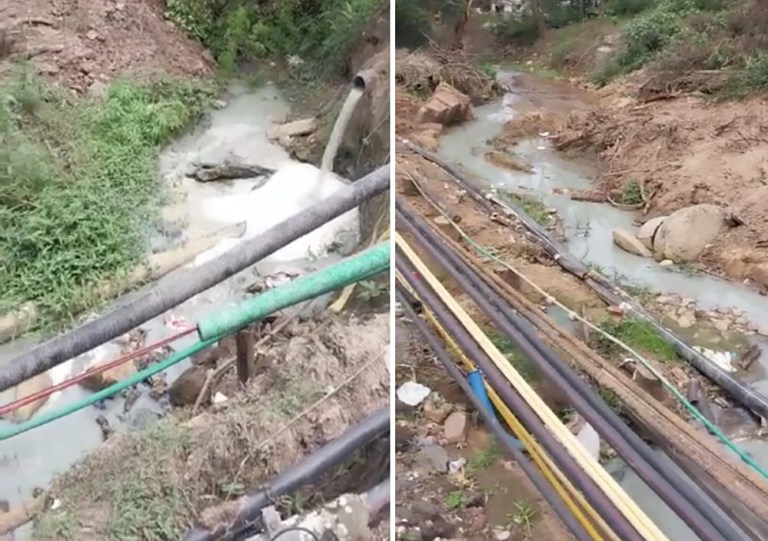
Recent sewage spills in the Pinetown area. (Photo: EDTEA)
Within 30 days of a successful order, the eight respondents should be directed to provide a list of all wastewater treatment works and infrastructure still not operating and to implement interim repair plans.
Within 60 days, they should be directed to produce a status of infrastructure report prepared by an independent expert, with detailed time frames to ensure permanent repairs.
This report should also include advice from a team of environmental experts to assess the extent of environmental impacts on rivers, estuaries, beaches and seashores in eThekwini.
Mncwango concludes by alleging that “not one of the respondents has demonstrated the will to enforce the applicable legislation or attend to their constitutional obligations”.
Our Burning Planet tried to contact the eight respondents for their response to the court action, but not all responded.
Cogta spokesperson Lungi Mtshali confirmed that the court papers had been received and were being studied to ascertain the reason the minister and department had been cited and whether or not they would oppose the application.
The Department of Water and Sanitation spokesman, Sputnik Ratau, said: “The minister and department can only make an opinion once the papers are received and the necessary legal opinion sought and received.”
eThekwini has yet to respond formally, though city spokesman Msawakhe Mayisela issued a brief response on 18 November, stating: “The city has not been served with any court papers. As a result, we shall chart our next course of action once we have been served.”
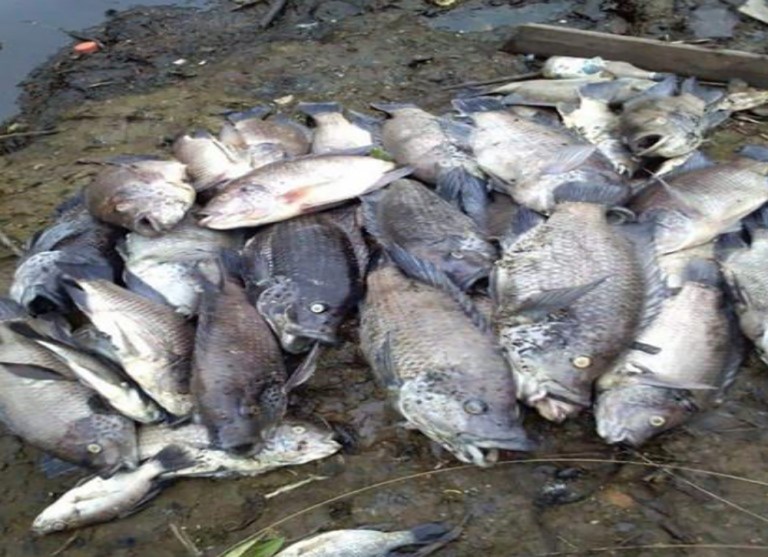
Dead fish in the polluted Isipingo River south of Durban. (Photo: EDTEA)
However, seemingly oblivious to several of the concerns around the sewage crisis, the city issued a media statement the day after the court papers were lodged, declaring that eThekwini had adopted an “all systems go” approach to the coming festive season. It has hired an extra 160 lifeguards and is hoping for a spate of last-minute holiday bookings and 75% occupancy rates in local hotels.
“The municipality’s Festive Season Management Committee (Fesmac) is hard at work to ensure the city’s readiness to welcome the anticipated 312,000 visitors … to ensure that the holiday season is safe, that the city is clean and welcoming, that traffic is well managed, maintain public order and to work jointly with the law enforcement agencies.”
It had recruited another 160 festive season lifeguards, 135 litter pickers, 20 small plant operators, 67 “beach buddies”, 48 child-minders to care for separated children, 85 pool attendants and four pool cashiers.
“The direct spend by visitors to eThekwini during the festive season is expected to be around R48-million with a GDP contribution of R1.2-billion. Around 2,500 temporary jobs will be created as well as other business opportunities.
“The occupancy rate is expected to be around 75% across accommodation establishments. Currently, there is a 40% occupancy rate around the beachfront and 50% to 55% occupancy rates in Umhlanga. Last-minute bookings are expected at the end of November and the beginning of December.
“With the progress of the repair work to sanitation infrastructure, the city is optimistic that even more beaches will be open for everyone’s enjoyment. Work is at an advanced stage at the Ohlange Sewage Pump Station which is the station that impacted northern beaches. Work is also under way at the Northern Wastewater Treatment Works, which is the facility that was impacting central beaches. Contractors are also hard at work repairing sanitation infrastructure in other parts of the city.
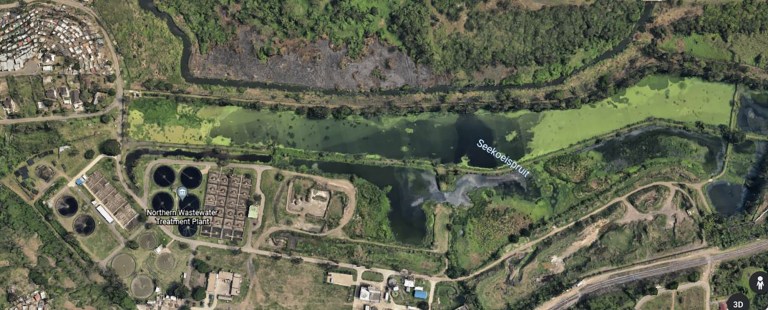
The Northern Wastewater Treatment Works in 2021 showing maturation ponds clogged with sediment, algae and vegetation. (Image: Supplied)
“Residents and visitors can cool off at the following beaches which are open for swimming: Point, uShaka, Addington, South, Wedge, North, Bay of Plenty, Battery, Country Club, Brighton, Reunion, Pipeline, Toti Main, Warner, and uMgababa beaches. In addition, the following swimming pools are open: Rainham, Durban North, Pipeline, Tiger Rocks, Anstey’s, Westville, and Kings Park complex both indoor and outdoor.” DM/OBP
Tomorrow, Part Two: Billions of rand go down the drain during Durban sewage crisis.
Criminal charges laid against Durban municipality as pressure mounts for probe and action on polluted waters

Durban’s beaches remain in the spotlight for all the wrong reasons, with legal pressure piling up on the city to plug the flow of untreated sewage. (Photo: Tony Carnie)
By Tony Carnie | 20 Nov 2022
A civil case was lodged in the Durban High Court last week (16 November) against eThekwini, four Cabinet ministers and several government departments by ActionSA, which is calling for an independent investigation — and an urgent rehabilitation plan — following the lengthy delay in repairing the city’s wastewater treatment infrastructure after the April/May floods and alleged city mismanagement that predates the flood damage.
The Democratic Alliance has indicated that it plans to launch similar legal action if the city fails to respond to a recent letter of demand, with DA provincial chair Dean Macpherson suggesting the party could subpoena eThekwini Mayor Mxolisi Kaunda and two national government ministers to account for the failure to enforce water and environmental conservation laws.
Now it has emerged that at least three criminal charges have also been laid against senior eThekwini officials by the KwaZulu-Natal provincial Department of Environment Affairs for the city’s alleged contravention of environmental pollution laws.

Sewage flows into a river in the Pinetown area. (Photo: EDTEA)
The charges came to light during the ninth Environmental Compliance and Enforcement Lekgotla (meeting) of the Green Scorpions in Muldersdrift, Gauteng, last week.
Dr BR “Zakhele” Dlamini, senior director (environmental management) of the KwaZulu-Natal Department of Economic Development, Tourism and Environmental Affairs, told the lekgotla that his department had served more than 30 administrative action directives on the city between 18 May and 30 August.
The directives were intended to remedy sewage flows into rivers and the sea and the subsequent closure of several beaches that had left the tourism industry “in turmoil”.
Dlamini said his department had taken water quality samples and handed over three criminal investigation dockets to the National Prosecuting Authority for pollution of the environment:
- CAS 150/04/2022 (relating to sewage pollution in the Eiderwood Close residential area in Phoenix);
- CAS 83/08/2022 (pollution and major fish kill in the Isipingo River); and
- CAS 203/09/2022 (sewage leaks into a stream adjoining Winkelspruit beach).

The three criminal charges against the Ethekwini municipality. (Image: Supplied)
In a separate presentation to the provincial legislature’s portfolio committee on environmental affairs on 1 November, Dlamini outlined the lengthy process his department had followed before taking the final step of laying charges against a fellow government department.
He suggested that in terms of Chapter 3 of the Constitution and the Intergovernmental Relations Framework Act, there was a duty to avoid legal proceedings against fellow organs of state and a need to “foster friendly relations, assist and support one another as organs of state”.
However, he said, legal proceedings did not preclude administrative enforcement measures by his department.
“While there is, therefore, no prohibition against issuing an administrative notice against an organ of state, acting in the spirit of co-operative governance dictates a less confrontational approach in dealing with non-compliant organs of state.”
But, he stated, in red text: “It is key to note that the Constitution does not prohibit legal proceedings between organs of state, but places a duty on organs of state to avoid such proceedings against each other.”

The Department of Water and Sanitation seems to have been following a similar procedure in trying to compel the city to remediate the sewage spills into rivers.
In its presentation to the portfolio committee, the department confirmed that it had issued a series of non-compliance notices to eThekwini Municipality in terms of the National Water Act over recent months. In response, representations from eThekwini were received on 13 July. The department reviewed these and indicated to the city that its action plan was “unsatisfactory” and that repair timelines had not been adhered to.
Noting that sewage flows into “most” city wastewater treatment works were still low (as of 1 November), the national Department of Water and Sanitation said that “work done to date on the sewerage infrastructure is not satisfactory” and that several rivers were still polluted with high levels of E. coli bacteria.
Now ActionSA has lodged a legal application in the Durban High Court in which the party’s provincial chair, Zwakele Mncwango, slams the city’s “lackadaisical approach” to resolving the pollution crisis.
“Whilst it is tragic that the public must approach the courts to [compel] the executive to act upon their obligations, which are clearly legislated, the public has no alternative remedy at this stage.”
Mncwango said the negative publicity surrounding the city’s polluted beaches had been “devastating” for the local tourism industry. It had also led to the cancellation of several ocean sports events, and some lifeguards and other municipal staff had expressed fears for their health following the recent reopening of several beaches.

ActionSA affidavit. (Image: Supplied)

ActionSA affidavit. (Image: Supplied)
Apart from the eThekwini Municipality and Mayor Kaunda, the party has cited six other respondents in the court action: Tourism Minister Lindiwe Sisulu, Water and Sanitation Minister Senzo Mchunu, Environment Minister Barbara Creecy, Co-operative Governance and Traditional Affairs (Cogta) Minister Nkosazana Dlamini Zuma, Cogta MEC Sihle Zikalala and Environment MEC Siboniso Duma.
All have 15 days to indicate whether they wish to oppose the application and a further 15 days thereafter to file responding papers if they choose to oppose the suit.
However, it appears that a court hearing is unlikely until 27 February at the earliest, depending on whether the city and other respondents oppose the court action.
Mncwango says his party seeks an order declaring the conduct of the eight government respondents to be in contravention of the National Environmental Management: Waste Act 59 of 2008 which aims to “protect health and the environment by providing reasonable measures for the prevention of pollution and ecological degradation”.

Sewage pours from a sewer line near Westbrook beach, north of Durban, on 22 September. (Photo: Supplied)
The party says it also seeks to enforce provisions of the Constitution guaranteeing people’s right to dignity and to an environment which is not harmful to their health or wellbeing.
Referring to a 31-page “storm recovery” plan prepared by the city in October, Mncwango says it is clear that the municipality “has done very little since the floods (at the very latest) to secure the appropriate remedial measures to remedy the dire situation”.
Difficulties in appointing service providers to remedy the problems had become a “repetitive excuse”. Budget availability had become another such “excuse”, he suggested, even though the government had announced measures in April to make R1-billion available immediately to alleviate the flood disaster.
Several months down the line, there was no clear breakdown of where all this emergency funding had gone.
“It is accordingly the view of [ActionSA] that a proper and independent investigation into the actual state of the crisis facing eThekwini must now be carried out … in order that this devastating crisis can be remedied and prevented.”
Should the high court grant its application, Mncwango says his party would also seek an order directing the eight government bodies/officials to appoint an independent water or sanitation expert to conduct more regular tests of seawater at Durban beaches.

Recent sewage spills in the Pinetown area. (Photo: EDTEA)
Within 30 days of a successful order, the eight respondents should be directed to provide a list of all wastewater treatment works and infrastructure still not operating and to implement interim repair plans.
Within 60 days, they should be directed to produce a status of infrastructure report prepared by an independent expert, with detailed time frames to ensure permanent repairs.
This report should also include advice from a team of environmental experts to assess the extent of environmental impacts on rivers, estuaries, beaches and seashores in eThekwini.
Mncwango concludes by alleging that “not one of the respondents has demonstrated the will to enforce the applicable legislation or attend to their constitutional obligations”.
Our Burning Planet tried to contact the eight respondents for their response to the court action, but not all responded.
Cogta spokesperson Lungi Mtshali confirmed that the court papers had been received and were being studied to ascertain the reason the minister and department had been cited and whether or not they would oppose the application.
The Department of Water and Sanitation spokesman, Sputnik Ratau, said: “The minister and department can only make an opinion once the papers are received and the necessary legal opinion sought and received.”
eThekwini has yet to respond formally, though city spokesman Msawakhe Mayisela issued a brief response on 18 November, stating: “The city has not been served with any court papers. As a result, we shall chart our next course of action once we have been served.”

Dead fish in the polluted Isipingo River south of Durban. (Photo: EDTEA)
However, seemingly oblivious to several of the concerns around the sewage crisis, the city issued a media statement the day after the court papers were lodged, declaring that eThekwini had adopted an “all systems go” approach to the coming festive season. It has hired an extra 160 lifeguards and is hoping for a spate of last-minute holiday bookings and 75% occupancy rates in local hotels.
“The municipality’s Festive Season Management Committee (Fesmac) is hard at work to ensure the city’s readiness to welcome the anticipated 312,000 visitors … to ensure that the holiday season is safe, that the city is clean and welcoming, that traffic is well managed, maintain public order and to work jointly with the law enforcement agencies.”
It had recruited another 160 festive season lifeguards, 135 litter pickers, 20 small plant operators, 67 “beach buddies”, 48 child-minders to care for separated children, 85 pool attendants and four pool cashiers.
“The direct spend by visitors to eThekwini during the festive season is expected to be around R48-million with a GDP contribution of R1.2-billion. Around 2,500 temporary jobs will be created as well as other business opportunities.
“The occupancy rate is expected to be around 75% across accommodation establishments. Currently, there is a 40% occupancy rate around the beachfront and 50% to 55% occupancy rates in Umhlanga. Last-minute bookings are expected at the end of November and the beginning of December.
“With the progress of the repair work to sanitation infrastructure, the city is optimistic that even more beaches will be open for everyone’s enjoyment. Work is at an advanced stage at the Ohlange Sewage Pump Station which is the station that impacted northern beaches. Work is also under way at the Northern Wastewater Treatment Works, which is the facility that was impacting central beaches. Contractors are also hard at work repairing sanitation infrastructure in other parts of the city.

The Northern Wastewater Treatment Works in 2021 showing maturation ponds clogged with sediment, algae and vegetation. (Image: Supplied)
“Residents and visitors can cool off at the following beaches which are open for swimming: Point, uShaka, Addington, South, Wedge, North, Bay of Plenty, Battery, Country Club, Brighton, Reunion, Pipeline, Toti Main, Warner, and uMgababa beaches. In addition, the following swimming pools are open: Rainham, Durban North, Pipeline, Tiger Rocks, Anstey’s, Westville, and Kings Park complex both indoor and outdoor.” DM/OBP
Tomorrow, Part Two: Billions of rand go down the drain during Durban sewage crisis.
"Education is the most powerful weapon which you can use to change the world." Nelson Mandela
The desire for equality must never exceed the demands of knowledge
The desire for equality must never exceed the demands of knowledge
- Richprins
- Committee Member
- Posts: 74882
- Joined: Sat May 19, 2012 3:52 pm
- Location: NELSPRUIT
- Contact:
Re: The State of The Rivers/Oceans/Water
A miracle! 
Key Durban sewage pump station repaired in time for festive season
23 November 2022 - 16:12
Suthentira Govender Senior reporter
The problematic Ohlange sewage pump station, which has seen Umhlanga Beach closed for long periods, has been fixed, says the eThekwini municipality.
Municipal spokesperson Msawakhe Mayisela said the station north of the city had been commissioned and the overflow into the Ohlanga River had stopped.
Last week the Sunday Times reported that Durban’s sewage pollution crisis had turned the popular seaside town of Umhlanga into an “undesirable” holiday destination, projected to lose R25m a day if its beaches didn't open during the peak summer season.
The condition of the beach resulted in a lag in hotel bookings for the festive season, leaving establishments concerned about whether they would see an uptick in reservations.
Mayisela said teams worked “tirelessly to ensure the pump station was back online in time for the festive season.
“This is a milestone and a proud moment for our teams.
“The commissioning of the pump station also means the water quality at Umhlanga Beach will continue to improve.
“The city is working to recommission other pump stations so we can finally bring under control the current sanitation challenges.”
Water treatment service Talbot, which conducts regular testing of the ocean and rivers for E coli, said in a Facebook post on Tuesday that “it may be too soon to be optimistic, but water quality is looking great at the eThekwini and Umhlanga main beaches. The repairs to the wastewater treatment works are having a positive effect and [we are] hopeful this trend continues and is not just a temporary measure.”
Its reading for Umhlanga and Bronze beaches showed low levels of E coli. Anything above 500 counts per 100ml is considered critical and warrants a beach closure.
TimesLIVE
https://www.sowetanlive.co.za/news/sout ... ve-season/
Key Durban sewage pump station repaired in time for festive season
23 November 2022 - 16:12
Suthentira Govender Senior reporter
The problematic Ohlange sewage pump station, which has seen Umhlanga Beach closed for long periods, has been fixed, says the eThekwini municipality.
Municipal spokesperson Msawakhe Mayisela said the station north of the city had been commissioned and the overflow into the Ohlanga River had stopped.
Last week the Sunday Times reported that Durban’s sewage pollution crisis had turned the popular seaside town of Umhlanga into an “undesirable” holiday destination, projected to lose R25m a day if its beaches didn't open during the peak summer season.
The condition of the beach resulted in a lag in hotel bookings for the festive season, leaving establishments concerned about whether they would see an uptick in reservations.
Mayisela said teams worked “tirelessly to ensure the pump station was back online in time for the festive season.
“This is a milestone and a proud moment for our teams.
“The commissioning of the pump station also means the water quality at Umhlanga Beach will continue to improve.
“The city is working to recommission other pump stations so we can finally bring under control the current sanitation challenges.”
Water treatment service Talbot, which conducts regular testing of the ocean and rivers for E coli, said in a Facebook post on Tuesday that “it may be too soon to be optimistic, but water quality is looking great at the eThekwini and Umhlanga main beaches. The repairs to the wastewater treatment works are having a positive effect and [we are] hopeful this trend continues and is not just a temporary measure.”
Its reading for Umhlanga and Bronze beaches showed low levels of E coli. Anything above 500 counts per 100ml is considered critical and warrants a beach closure.
TimesLIVE
https://www.sowetanlive.co.za/news/sout ... ve-season/
Please check Needs Attention pre-booking: https://africawild-forum.com/viewtopic.php?f=322&t=596
- Lisbeth
- Site Admin
- Posts: 65368
- Joined: Sat May 19, 2012 12:31 pm
- Country: Switzerland
- Location: Lugano
- Contact:
Re: The State of The Rivers/Oceans/Water
I'd test the water at Umhlanga Beach personally before going into the water 
 for the festive season
for the festive season 

It should be every day's normal businessThis is a milestone and a proud moment for our teams.
"Education is the most powerful weapon which you can use to change the world." Nelson Mandela
The desire for equality must never exceed the demands of knowledge
The desire for equality must never exceed the demands of knowledge
- Lisbeth
- Site Admin
- Posts: 65368
- Joined: Sat May 19, 2012 12:31 pm
- Country: Switzerland
- Location: Lugano
- Contact:
Re: The State of The Rivers/Oceans/Water
Eskom is the world’s biggest emitter of sulphur dioxide. South Africa’s beaches from Cape Town to Durban are regular sites of sewage spills and high e-coli levels. Rivers around the country are veritable dumps for all manner of waste while tons of chemicals leech into the ground and water sources.
Whether the effects are felt immediately or in years to come, it’s no exaggeration to say South Africans are being poisoned.
This week, Our Burning Planet has launched a series called Toxic Inc to shine a spotlight on how South Africans are being poisoned. Through this series, our journalists will, among others, highlight Eskom’s failure to control pollution emissions and its effects on the health of the people living in the shadow of its plume or how government negligence has led to the rising tide of beach pollution. (see the latest samples from the Umgeni River system below)
Let us know of areas that could do with some focus by emailing the team on obp@dailymaverick.co.za
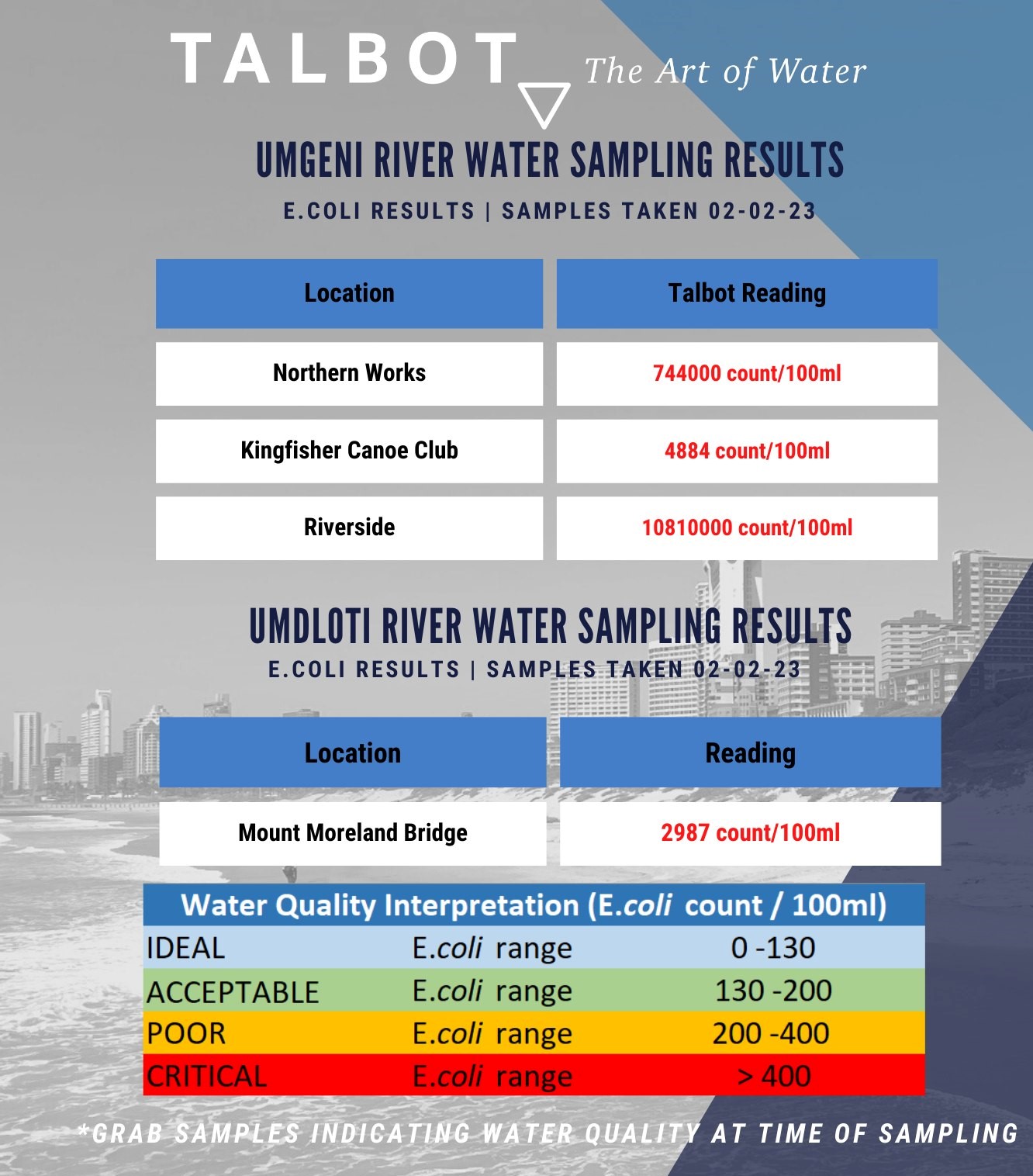
Latest water sampling results from Umgeni River in KwaZulu-Natal
Whether the effects are felt immediately or in years to come, it’s no exaggeration to say South Africans are being poisoned.
This week, Our Burning Planet has launched a series called Toxic Inc to shine a spotlight on how South Africans are being poisoned. Through this series, our journalists will, among others, highlight Eskom’s failure to control pollution emissions and its effects on the health of the people living in the shadow of its plume or how government negligence has led to the rising tide of beach pollution. (see the latest samples from the Umgeni River system below)
Let us know of areas that could do with some focus by emailing the team on obp@dailymaverick.co.za

Latest water sampling results from Umgeni River in KwaZulu-Natal
"Education is the most powerful weapon which you can use to change the world." Nelson Mandela
The desire for equality must never exceed the demands of knowledge
The desire for equality must never exceed the demands of knowledge
- Lisbeth
- Site Admin
- Posts: 65368
- Joined: Sat May 19, 2012 12:31 pm
- Country: Switzerland
- Location: Lugano
- Contact:
Re: The State of The Rivers/Oceans/Water
Raising a stink: Government departments blame Durban officials for slow response to sewage crisis
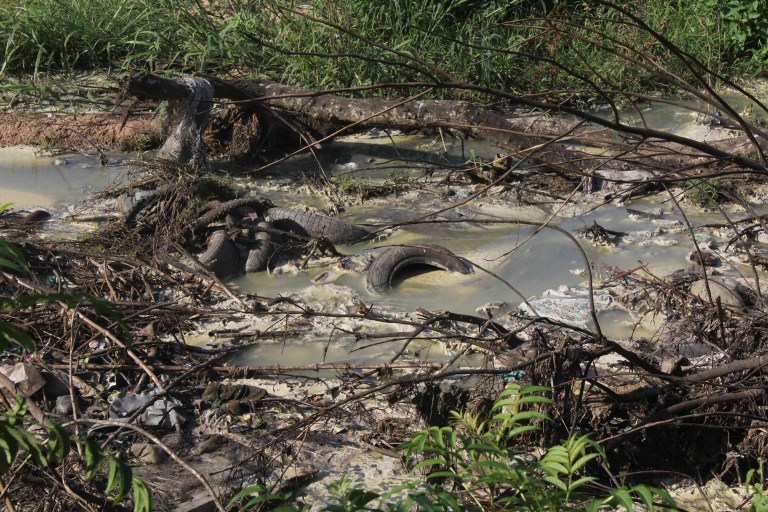
Rotting sewage effluent along the banks of the Umgeni River in Durban. (Photo: Tony Carnie)
Five government departments have closed ranks, insisting that they did everything possible to pressure senior Durban officials to stem sewage flows before and after the April 2022 floods.
___________________________________________________________________________________________________________________
In an affidavit to the Durban High Court, a senior official in the national Department of Water and Sanitation recalled how he sent a directive to eThekwini city manager Musa Mbhele on 4 July last year, expressing concern that city officials were “not engaging in good faith” to resolve the sewage pollution crisis swiftly.
This was at a time when an estimated 66% of the city’s sewage and industrial effluent was flowing untreated into local rivers and the sea after storm-related damage during the April 2022 floods.
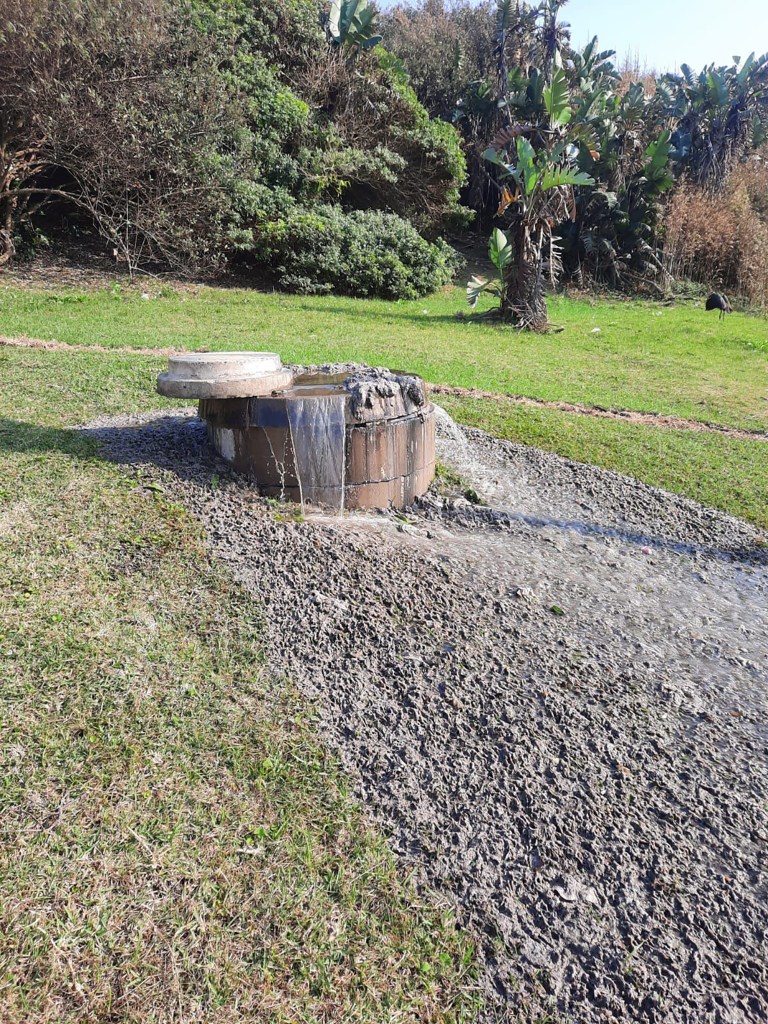
Effluent pours from a sewer line near Westbrook beach. (Photo: Supplied)
Ashley Starkey, provincial head of the national Water and Sanitation Department, states in his affidavit that he issued a directive on 13 May (about a month after the floods) ordering the city to submit a time-bound action plan within 20 days on what they intended to do to halt the pollution of local water resources.
Read more in Daily Maverick: “Durban’s sewage-fouled beaches closed indefinitely for swimming”
The city was also directed to start repairing broken pipes, malfunctioning pump stations and other damaged sewage-to-sewage infrastructure within 30 days.
However, the city pleaded for more time and said it could not meet the stipulated time frames due to resource and budget constraints – adding that it had already embarked on minor repairs and had also applied to the National Disaster Management Centre for extra funds to deal with the crisis.
‘Not engaging in good faith’

Ashely Starkey, the provincial director of the Department of Water and Sanitation complains that, ten weeks after the floods, there was still no obvious progress to curb sewage pollution around Durban.
However, after considering eThekwini’s request, Starkey wrote back to Mbhele, stating: “(My) department is of the opinion that the eThekwni Metropolitan Municipality is not engaging with the Department of Water and Sanitation in good faith.”
Noting that the department had issued the first clean-up directive a month after the main floods, Starkey further noted that certain information requested from the city was either “inadequate, delayed or not forthcoming” – despite urgent intergovernmental “war room” meetings to address the flood impacts.
Starkey’s affidavit follows a civil claim by ActionSA in which the party maintains that eThekwini and several government departments had adopted a “lackadaisical” approach towards resolving the crisis.
Read more in Daily Maverick: “Government official points to eThekwini negligence for Durban’s rising tide of beach pollution”
Starkey has rejected this suggestion on behalf of his department as well as the national departments of the environment; cooperative governance; tourism and two provincial government departments.
All these departments acknowledged that the sewage pollution following the April floods was “unacceptable” and posed a danger to public health, the environment and water resources.
“However, each of the respondents acted immediately, within their constitutional and statutory powers, to ensure that emergency measures were taken by (eThekwini) to stop such pollution.”
Read more in Daily Maverick: “Government dithers over court or ‘stern talks’ to resolve Durban’s sewage pollution crisis”
He further argues that the three tiers of government (national, provincial and local) all have clearly defined areas of responsibility and that ActionSA had failed to take sufficient account of cooperative governance strictures that discourage government departments from taking legal action against each other.
Read more in Daily Maverick: “Criminal charges laid against Durban municipality as pressure mounts for probe and action on polluted waters”
Nevertheless, says Starkey, his department had initiated regulatory action against eThekwini for sewage pollution offences – even before the floods.
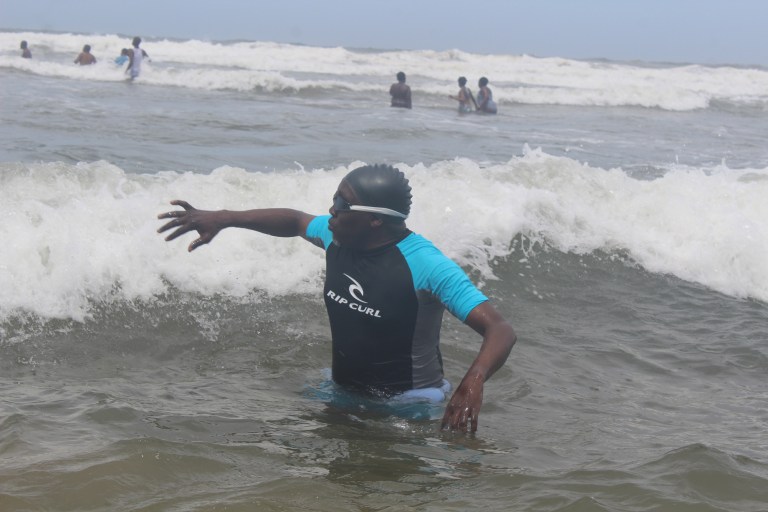
Durban Mayor Mxolisi Kaunda takes a dip in the sea on 1 December 2022 in a desperate bid to woo tourists back to the city’s beaches. (Photo: Tony Carnie)
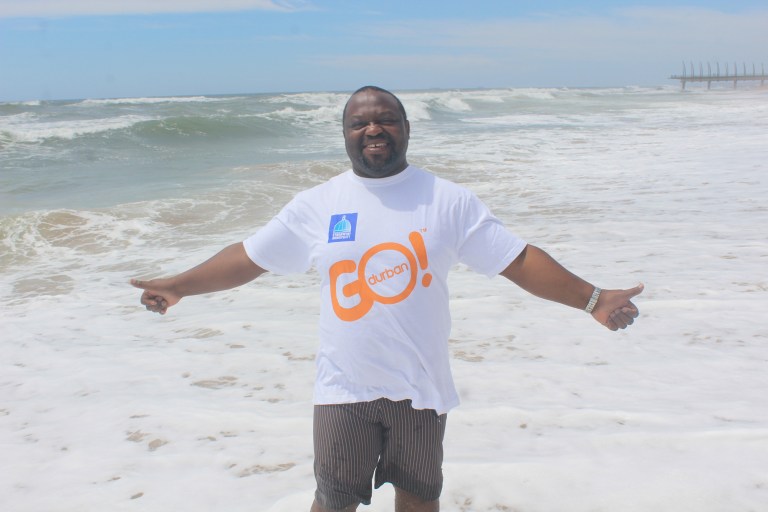
Durban deputy city manager and head of the parks and recreation department, Dr Musa Gumede, takes a dip at Umhlanga beach. (Photo: Tony Carnie)
In a separate affidavit on behalf of national Environment Minister Barbara Creecy, one of her senior officials states that the sewage “challenges” in eThekwini had been evident “for a number of years” (before the April 2022 floods).
Vanessa Bendeman, a director-general in Creecy’s department, says one example of this was the frequent pollution from the Mahatma Gandhi (Point Road) sewage pump station. This station, the largest in the city, had a throughput of tens of millions of litres per hour.
Due to persistent and unresolved sewage overflows from this station, Bendeman’s department had laid a criminal charge against the city in November 2021 (before the floods).
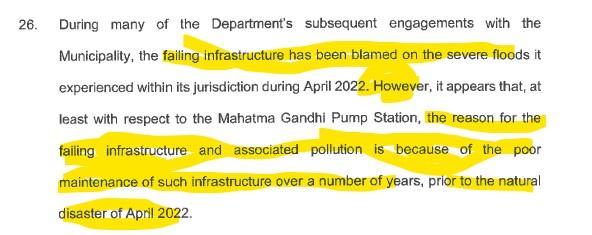
Senior Environment department director Vanessa Bendeman suggests that Ethekwini has been using the floods as an excuse for failing infrastructure.
“During many of (my) department’s subsequent engagements with the municipality, the failing infrastructure has been blamed on the severe floods…
“However, it appears that, at least with respect to the Mahatma Gandhi pump station, the reason for failing infrastructure and associated pollution is because of the poor maintenance of such infrastructure over a number of years.”
Bendeman goes on to describe how, since about 2017, nearby shopping centres and restaurants had “been severely affected by the unbearable stench, unhygienic conditions and unsightliness” of sewage in the harbour.
“This has crippled trade and patrons have chosen to stay away. As a direct result of this, some of these retail establishments have had to close and this has resulted in losses and unemployment.”
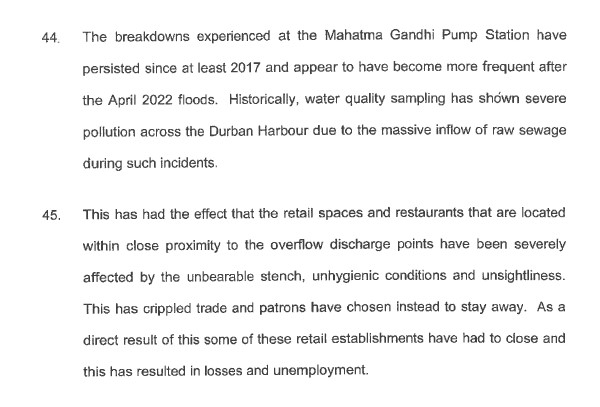
Environment department director Vanessa Bendeman details some of the consequences of recurrent sewage overflows in Durban.
Impact on Transnet, ship repair industry
Transnet, the ship repair industry and diving companies had also been affected by the regular sewage overflows from the Mahatma Gandhi pump station because commercial diving operations had been banned due to the potential health threat to divers.
“This has had a severe and prejudicial impact on the ship repair industry… Because of this pollution, vessel owners now prefer to utilise ports outside South Africa for these repair services.”
Quite apart from affecting business, Bendeman says the unlawful discharge of untreated sewage into Durban harbour had also caused “considerable damage” to the environment and marine life because the level of oxygen in the water dropped when large volumes of sewage began to decompose.
Bendeman further complains that, despite eThekwini’s previous promises to repair the pump station properly, the undertakings had still not been met.
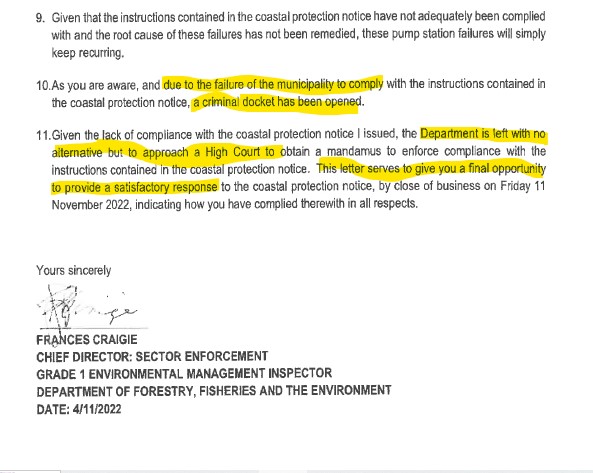
A final warning notice issued to the Ethekwini municipality by Green Scorpions director Frances Craigie.
ActionSA is seeking a civil court ruling from the Durban High Court directing eThekwini, six other government respondents and Durban mayor Mxolisi Kaunda to address the pollution, via recommendations by an independent group of experts.
So far, neither eThekwini, Kaunda or the national minister of tourism have lodged responding papers.
An application was due to be heard on 27 March, but has now been postponed to 3 April – eThekwini is required to file responding papers by 31 March.
However, it appears unlikely that the case will be heard before June at the earliest, when all the respondents have to file their final heads of argument. DM/OBP

Rotting sewage effluent along the banks of the Umgeni River in Durban. (Photo: Tony Carnie)
Five government departments have closed ranks, insisting that they did everything possible to pressure senior Durban officials to stem sewage flows before and after the April 2022 floods.
___________________________________________________________________________________________________________________
In an affidavit to the Durban High Court, a senior official in the national Department of Water and Sanitation recalled how he sent a directive to eThekwini city manager Musa Mbhele on 4 July last year, expressing concern that city officials were “not engaging in good faith” to resolve the sewage pollution crisis swiftly.
This was at a time when an estimated 66% of the city’s sewage and industrial effluent was flowing untreated into local rivers and the sea after storm-related damage during the April 2022 floods.

Effluent pours from a sewer line near Westbrook beach. (Photo: Supplied)
Ashley Starkey, provincial head of the national Water and Sanitation Department, states in his affidavit that he issued a directive on 13 May (about a month after the floods) ordering the city to submit a time-bound action plan within 20 days on what they intended to do to halt the pollution of local water resources.
Read more in Daily Maverick: “Durban’s sewage-fouled beaches closed indefinitely for swimming”
The city was also directed to start repairing broken pipes, malfunctioning pump stations and other damaged sewage-to-sewage infrastructure within 30 days.
However, the city pleaded for more time and said it could not meet the stipulated time frames due to resource and budget constraints – adding that it had already embarked on minor repairs and had also applied to the National Disaster Management Centre for extra funds to deal with the crisis.
‘Not engaging in good faith’

Ashely Starkey, the provincial director of the Department of Water and Sanitation complains that, ten weeks after the floods, there was still no obvious progress to curb sewage pollution around Durban.
However, after considering eThekwini’s request, Starkey wrote back to Mbhele, stating: “(My) department is of the opinion that the eThekwni Metropolitan Municipality is not engaging with the Department of Water and Sanitation in good faith.”
Noting that the department had issued the first clean-up directive a month after the main floods, Starkey further noted that certain information requested from the city was either “inadequate, delayed or not forthcoming” – despite urgent intergovernmental “war room” meetings to address the flood impacts.
Starkey’s affidavit follows a civil claim by ActionSA in which the party maintains that eThekwini and several government departments had adopted a “lackadaisical” approach towards resolving the crisis.
Read more in Daily Maverick: “Government official points to eThekwini negligence for Durban’s rising tide of beach pollution”
Starkey has rejected this suggestion on behalf of his department as well as the national departments of the environment; cooperative governance; tourism and two provincial government departments.
All these departments acknowledged that the sewage pollution following the April floods was “unacceptable” and posed a danger to public health, the environment and water resources.
“However, each of the respondents acted immediately, within their constitutional and statutory powers, to ensure that emergency measures were taken by (eThekwini) to stop such pollution.”
Read more in Daily Maverick: “Government dithers over court or ‘stern talks’ to resolve Durban’s sewage pollution crisis”
He further argues that the three tiers of government (national, provincial and local) all have clearly defined areas of responsibility and that ActionSA had failed to take sufficient account of cooperative governance strictures that discourage government departments from taking legal action against each other.
Read more in Daily Maverick: “Criminal charges laid against Durban municipality as pressure mounts for probe and action on polluted waters”
Nevertheless, says Starkey, his department had initiated regulatory action against eThekwini for sewage pollution offences – even before the floods.

Durban Mayor Mxolisi Kaunda takes a dip in the sea on 1 December 2022 in a desperate bid to woo tourists back to the city’s beaches. (Photo: Tony Carnie)

Durban deputy city manager and head of the parks and recreation department, Dr Musa Gumede, takes a dip at Umhlanga beach. (Photo: Tony Carnie)
In a separate affidavit on behalf of national Environment Minister Barbara Creecy, one of her senior officials states that the sewage “challenges” in eThekwini had been evident “for a number of years” (before the April 2022 floods).
Vanessa Bendeman, a director-general in Creecy’s department, says one example of this was the frequent pollution from the Mahatma Gandhi (Point Road) sewage pump station. This station, the largest in the city, had a throughput of tens of millions of litres per hour.
Due to persistent and unresolved sewage overflows from this station, Bendeman’s department had laid a criminal charge against the city in November 2021 (before the floods).

Senior Environment department director Vanessa Bendeman suggests that Ethekwini has been using the floods as an excuse for failing infrastructure.
“During many of (my) department’s subsequent engagements with the municipality, the failing infrastructure has been blamed on the severe floods…
“However, it appears that, at least with respect to the Mahatma Gandhi pump station, the reason for failing infrastructure and associated pollution is because of the poor maintenance of such infrastructure over a number of years.”
Bendeman goes on to describe how, since about 2017, nearby shopping centres and restaurants had “been severely affected by the unbearable stench, unhygienic conditions and unsightliness” of sewage in the harbour.
“This has crippled trade and patrons have chosen to stay away. As a direct result of this, some of these retail establishments have had to close and this has resulted in losses and unemployment.”

Environment department director Vanessa Bendeman details some of the consequences of recurrent sewage overflows in Durban.
Impact on Transnet, ship repair industry
Transnet, the ship repair industry and diving companies had also been affected by the regular sewage overflows from the Mahatma Gandhi pump station because commercial diving operations had been banned due to the potential health threat to divers.
“This has had a severe and prejudicial impact on the ship repair industry… Because of this pollution, vessel owners now prefer to utilise ports outside South Africa for these repair services.”
Quite apart from affecting business, Bendeman says the unlawful discharge of untreated sewage into Durban harbour had also caused “considerable damage” to the environment and marine life because the level of oxygen in the water dropped when large volumes of sewage began to decompose.
Bendeman further complains that, despite eThekwini’s previous promises to repair the pump station properly, the undertakings had still not been met.

A final warning notice issued to the Ethekwini municipality by Green Scorpions director Frances Craigie.
ActionSA is seeking a civil court ruling from the Durban High Court directing eThekwini, six other government respondents and Durban mayor Mxolisi Kaunda to address the pollution, via recommendations by an independent group of experts.
So far, neither eThekwini, Kaunda or the national minister of tourism have lodged responding papers.
An application was due to be heard on 27 March, but has now been postponed to 3 April – eThekwini is required to file responding papers by 31 March.
However, it appears unlikely that the case will be heard before June at the earliest, when all the respondents have to file their final heads of argument. DM/OBP
"Education is the most powerful weapon which you can use to change the world." Nelson Mandela
The desire for equality must never exceed the demands of knowledge
The desire for equality must never exceed the demands of knowledge
- Lisbeth
- Site Admin
- Posts: 65368
- Joined: Sat May 19, 2012 12:31 pm
- Country: Switzerland
- Location: Lugano
- Contact:
Re: The State of The Rivers/Oceans/Water
I often wonder how the various municipal officials around South Africa, spend their time. Certainly not working for the various communities, big or small 
"Education is the most powerful weapon which you can use to change the world." Nelson Mandela
The desire for equality must never exceed the demands of knowledge
The desire for equality must never exceed the demands of knowledge
- Lisbeth
- Site Admin
- Posts: 65368
- Joined: Sat May 19, 2012 12:31 pm
- Country: Switzerland
- Location: Lugano
- Contact:
Re: The State of The Rivers/Oceans/Water
METRO MELTDOWN | Durban's sewer network on verge of collapse; municipality has no money for maintenance
The story: eThekwini’s sewer infrastructure faces a high risk of collapsing completely should officials fail to do urgent maintenance.
Why it matters: The collapse of the sewer network will result in ecological and health disasters.
However: The municipality does not have the funds it needs to carry out maintenance and refurbish its sewer system in the short, medium, and long term.
The story: eThekwini’s sewer infrastructure faces a high risk of collapsing completely should officials fail to do urgent maintenance.
Why it matters: The collapse of the sewer network will result in ecological and health disasters.
However: The municipality does not have the funds it needs to carry out maintenance and refurbish its sewer system in the short, medium, and long term.
"Education is the most powerful weapon which you can use to change the world." Nelson Mandela
The desire for equality must never exceed the demands of knowledge
The desire for equality must never exceed the demands of knowledge
- Lisbeth
- Site Admin
- Posts: 65368
- Joined: Sat May 19, 2012 12:31 pm
- Country: Switzerland
- Location: Lugano
- Contact:
Re: The State of The Rivers/Oceans/Water
Bright blue stream sparks new call for Durban water pollution clampdown
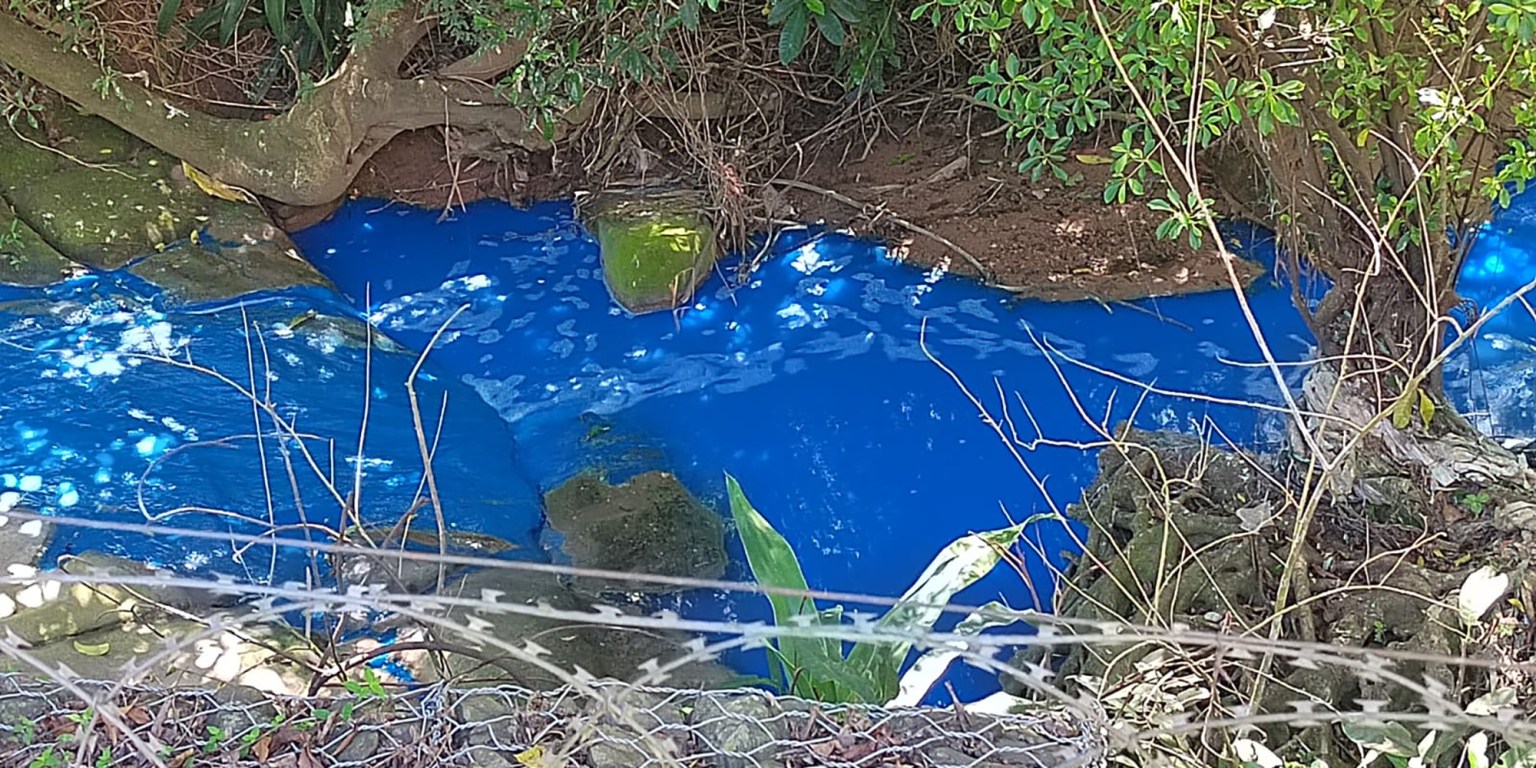
Garish blue water flows through a stream in the New Germany industrial area, Durban. The stream leads into the Umgeni River before entering the sea at Blue Lagoon. (Photo: Supplied)
By Tony Carnie | 16 Mar 2023
Several rivers in Durban have been a muddy brown colour over recent months. But this week, factory workers in the New Germany industrial area were shocked by the vivid blue colour of a local stream that flows into the city’s largest river system.
_________________________________________________________________________________________________________________________
Alocal industry worker said he became aware of the pollution at 8.30am on 13 March, and it was reported to city authorities later that morning with an exact GPS locator pin.
However, more than 24 hours later, the stream was still visibly polluted – albeit running a “lighter” blue colour. The polluted stream off Valley View Road in New Germany flows eastward through Clermont before joining the Umgeni River.
The worker, whose identity is known but who did not wish to be named due to company restrictions on speaking to the media, said he also noticed a strong “toxic or acidic” smell next to the stream.
“This has been happening for months. At times, the stream runs a pinky-red colour and the next week it is yellow or green. This is wrong, but so many people just seem to shrug their shoulders and accept it as the norm.”
The GPS pin shows that the polluted site is surrounded by a wide variety of factories, light industry and logistics centres.
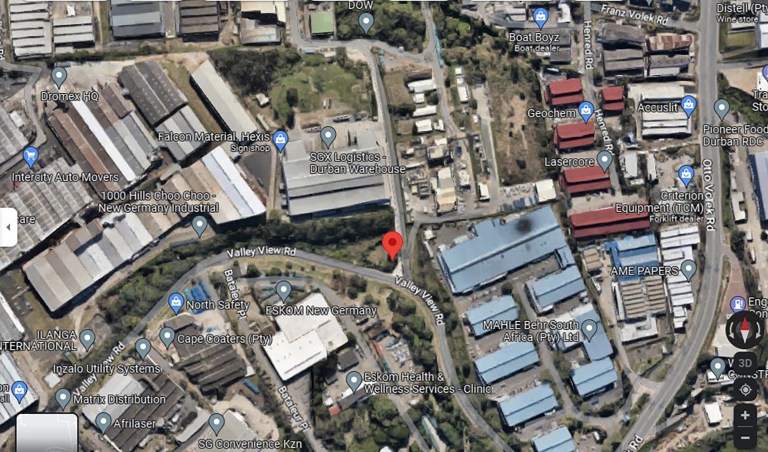
A Google Maps screenshot with a red pin showing the pollution site at the corner of Valley View Road and Schafer Road in New Germany.
Our Burning Planet sent queries to the eThekwini municipality on 14 March asking whether any water samples had been collected and if inspectors had been able to trace the visible trail of discoloured water back to its source. No response has been received.
Although industries are authorised to discharge certain effluents into the sewer network for further treatment at municipal treatment works, the national Water Act prohibits pollution discharges directly into streams and rivers.
The bright blue colour seen this week was a highly visible manifestation of pollution in an industrial area, but there is also concern about the continued flow of less visible effluent or pathogenic bacteria from sewer line leaks and poor wastewater treatment following the floods of April last year.
Janet Simpkins, founder of the Adopt-A-River watchdog group, says there is growing anger among residents and businesses over the state of river systems. She says she hopes people are no longer willing to allow the status quo to go unchallenged.
“Various organisations and individuals across the city and KwaZulu-Natal are working towards finding long-term solutions for the poor state of our river systems. We are exploring all possible means of changing the status quo.”
Regular testing
One proven method, she said, was the regular testing and publication of E. coli (sewage bacteria) results by private individuals and non-profit organisations.
“We will continue to test, expose and demand accountability river by river, beach by beach,” said Simpkins.
She was commenting on recent E. coli tests by WaterCAN, an initiative of the Organisation Undoing Tax Abuse, which has also written to the eThekwini Municipality to immediately address the “dangerously high levels” of E. coli in the Umbilo River.
WaterCAN and Adopt-A-River conducted a series of E. coli tests both below and above the Umbilo River Waste Water Treatment Works (WWTW) over a period of six weeks. The collected samples were tested by Talbot Laboratories.
In their letter to the municipality, the two organisations urged the city to inspect, repair and maintain the Umbilo River WWTW. They have also urged the city to identify and repair broken sewerage lines overflowing into the Umbilo River.
WaterCAN’s KwaZulu-Natal representative, Jonathan Erasmus, said the sample results should worry every senior city official whose mandate it is to protect and maintain the city’s water systems.
“City officials’ constant neglect of our waterways could result in them being criminally charged. This is not an idle threat, as there is case law developing around this type of accountability.
“The city needs to take the issue of water safety extremely seriously. In a water-scarce country like ours, the preservation of our water sources should be among the highest priorities of national, local and provincial governments,” said Erasmus. DM/OBP

Garish blue water flows through a stream in the New Germany industrial area, Durban. The stream leads into the Umgeni River before entering the sea at Blue Lagoon. (Photo: Supplied)
By Tony Carnie | 16 Mar 2023
Several rivers in Durban have been a muddy brown colour over recent months. But this week, factory workers in the New Germany industrial area were shocked by the vivid blue colour of a local stream that flows into the city’s largest river system.
_________________________________________________________________________________________________________________________
Alocal industry worker said he became aware of the pollution at 8.30am on 13 March, and it was reported to city authorities later that morning with an exact GPS locator pin.
However, more than 24 hours later, the stream was still visibly polluted – albeit running a “lighter” blue colour. The polluted stream off Valley View Road in New Germany flows eastward through Clermont before joining the Umgeni River.
The worker, whose identity is known but who did not wish to be named due to company restrictions on speaking to the media, said he also noticed a strong “toxic or acidic” smell next to the stream.
“This has been happening for months. At times, the stream runs a pinky-red colour and the next week it is yellow or green. This is wrong, but so many people just seem to shrug their shoulders and accept it as the norm.”
The GPS pin shows that the polluted site is surrounded by a wide variety of factories, light industry and logistics centres.

A Google Maps screenshot with a red pin showing the pollution site at the corner of Valley View Road and Schafer Road in New Germany.
Our Burning Planet sent queries to the eThekwini municipality on 14 March asking whether any water samples had been collected and if inspectors had been able to trace the visible trail of discoloured water back to its source. No response has been received.
Although industries are authorised to discharge certain effluents into the sewer network for further treatment at municipal treatment works, the national Water Act prohibits pollution discharges directly into streams and rivers.
The bright blue colour seen this week was a highly visible manifestation of pollution in an industrial area, but there is also concern about the continued flow of less visible effluent or pathogenic bacteria from sewer line leaks and poor wastewater treatment following the floods of April last year.
Janet Simpkins, founder of the Adopt-A-River watchdog group, says there is growing anger among residents and businesses over the state of river systems. She says she hopes people are no longer willing to allow the status quo to go unchallenged.
“Various organisations and individuals across the city and KwaZulu-Natal are working towards finding long-term solutions for the poor state of our river systems. We are exploring all possible means of changing the status quo.”
Regular testing
One proven method, she said, was the regular testing and publication of E. coli (sewage bacteria) results by private individuals and non-profit organisations.
“We will continue to test, expose and demand accountability river by river, beach by beach,” said Simpkins.
She was commenting on recent E. coli tests by WaterCAN, an initiative of the Organisation Undoing Tax Abuse, which has also written to the eThekwini Municipality to immediately address the “dangerously high levels” of E. coli in the Umbilo River.
WaterCAN and Adopt-A-River conducted a series of E. coli tests both below and above the Umbilo River Waste Water Treatment Works (WWTW) over a period of six weeks. The collected samples were tested by Talbot Laboratories.
In their letter to the municipality, the two organisations urged the city to inspect, repair and maintain the Umbilo River WWTW. They have also urged the city to identify and repair broken sewerage lines overflowing into the Umbilo River.
WaterCAN’s KwaZulu-Natal representative, Jonathan Erasmus, said the sample results should worry every senior city official whose mandate it is to protect and maintain the city’s water systems.
“City officials’ constant neglect of our waterways could result in them being criminally charged. This is not an idle threat, as there is case law developing around this type of accountability.
“The city needs to take the issue of water safety extremely seriously. In a water-scarce country like ours, the preservation of our water sources should be among the highest priorities of national, local and provincial governments,” said Erasmus. DM/OBP
"Education is the most powerful weapon which you can use to change the world." Nelson Mandela
The desire for equality must never exceed the demands of knowledge
The desire for equality must never exceed the demands of knowledge
- Lisbeth
- Site Admin
- Posts: 65368
- Joined: Sat May 19, 2012 12:31 pm
- Country: Switzerland
- Location: Lugano
- Contact:
Re: The State of The Rivers/Oceans/Water
Durban agrees to provide ‘action plan’ on sewage pollution — one year after the floods
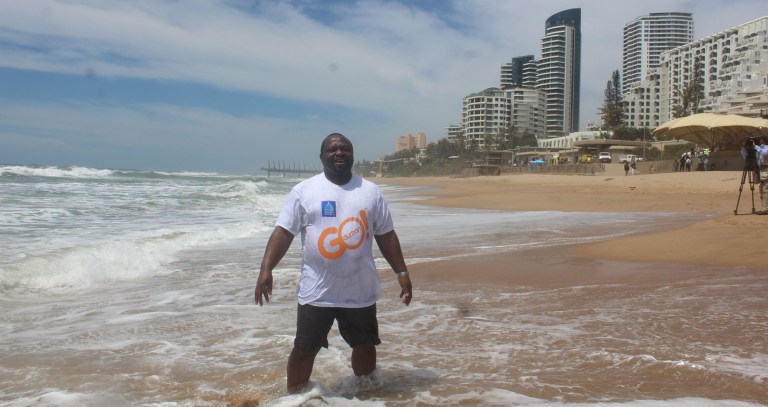
Ethekwini Deputy City Manager and head of the parks and recreation department, Dr Musa Gumede, takes a dip in the sea at Umhlanga beach on 1 December 2022, during a publicity campaign by the city to woo tourists back to the sea in Durban. (Photo: Tony Carnie)
By Tony Carnie | 03 Apr 2023
Nigh on a year after devastating floods hit the KwaZulu-Natal coastline, Durban municipal leaders have agreed finally to publish a detailed ‘action plan’ to repair and upgrade the city’s battered sewage and water infrastructure network.
______________________________________________________________________________________________________________
The undertaking by the eThekwini municipality to publish its clean-up action plan within 30 days, comes in response to legal pressure by the ActionSA political party, which lodged an application against the city and other government departments in the Durban division of the High Court of South Africa on 16 November 2022.
In a court affidavit signed last week (31 March), eThekwini Water and Sanitation chief Ednick Msweli insisted that it was now safe to swim again at most Durban beaches — and that the city’s 8,500km network of water and sanitation pipelines was now “substantially operational”.
Read more in Daily Maverick: Criminal charges laid against Durban municipality as pressure mounts for probe and action on polluted waters
Therefore, he argued, there was no reason why the high court should agree to ActionSA’s request for the appointment of a team of independent engineers to prepare a report on how to “permanently restore” the city’s water and sewage network.
Msweli said he did not deny that sewage bacteria readings had reached “unacceptable levels” at several Durban beaches when ActionSA first lodged its court papers. But nearly five months after court action was launched, there was no longer any need for an investigation into this issue.
He also hit back at claims that eThekwini had been “dilatory” in its response to the Durban river and beach sewage pollution crisis, claiming this was “a gross distortion of the truth”.
The truth, he argued, was that most of the city’s water and sewerage infrastructure was designed by engineers to withstand a one-in-50-year flood event.

Sewage effluent pours from a sewer line at Westbrook beach north of Durban in late 2022. (Photo: Supplied)
But, during April and May 2022, the city’s infrastructure had been pummelled by two separate one-in-100-year flood events barely a month apart, and this led to devastating damage.
The municipality, he said, had taken “all reasonable steps and done all things necessary within the constraints of its available budget” to remedy the flood damage and sewage pollution crisis. He also denied suggestions that up to 80% of the city’s wastewater or sewage infrastructure was “dysfunctional” when ActionSA initiated the high court application.
According to Msweli, only 3% of the city’s water and sanitation infrastructure network needed refurbishment, replacement or modernisation before the April/May 2022 floods. He stated that initial water and sanitation infrastructure damage from the floods was assessed at around R1.4-billion, though this estimate had since been “significantly increased”.
Read more in Daily Maverick: Government dithers over court or ‘stern talks’ to resolve Durban’s sewage pollution crisis
eThekwini simply did not have the budget to repair the damage immediately, despite recent pledges from the Department of Cooperative Governance and Traditional Affairs (Cogta) to provide R1.5-billion for all flood-related damage.
As things turned out, he said, eThekwini initially diverted nearly R74-million of its normal expenditure to repair the water and sewage network immediately after the floods, while Cogta initially provided a further R49-million for sewage network repairs in the city.
These initial sums were “totally inadequate” for the sheer scale of the damage. Of the more recent Cogta funding pledge of R1.5-billion, only R228-million had been earmarked for the eThekwini Water and Sanitation department. While this would go “a long way” to repair the damage, it was still significantly less than what was needed.
Oddly, however, Msweli says in his affidavit that the latest estimates to fully repair and upgrade water and sanitation infrastructure in Durban were now closer to R3.5-billion over the next 10 years — in contrast to his earlier assertions that only 3% of the city’s water and sanitation infrastructure network needed refurbishment, replacement or modernisation before the April/May 2022 floods.
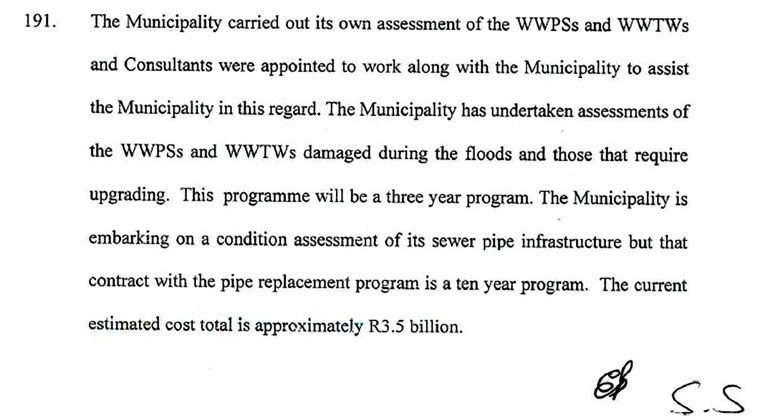
R3.5bn is needed to repair and upgrade Durban’s water and sewage pipe network — a court affidavit from Ethekwini Water and Sanitation head Ednick Msweli. (Image: Supplied)
Msweli’s assertions that the municipality “took all reasonable steps” to avert sewage pollution in the city also stand in stark contrast to evidence from several fellow government officials.
One example comes from Dr Bonginkosi Robert Dlamini, the acting chief director and director of compliance, monitoring and enforcement of the KwaZulu-Natal Department of Economic Affairs, Tourism and Environmental Affairs (Edtea). In his affidavit to the high court, Dlamini said his department served numerous pollution clean-up warning notices or directives on the eThekwini municipality — well before the floods — but the response from the city was not “satisfactory”.
As a result, his department (and members of the Green Scorpions environmental management inspectorate) had laid criminal charges with the SA Police Service calling for the prosecution of City Manager Musa Mbhele, former city manager Sipho Cele, and Msweli, for their alleged failure to control pollution levels.
‘Consistent and blatant failure’
Dlamini stated in an affidavit that there had been a “consistent and blatant failure” to halt the pollution of local rivers and the ocean — even before the April 2022 floods. Dlamini also provided copies of numerous directives and pre-directives served on the city since 2020 as well as a record of several meetings his department held with the city and officials from the national water affairs department.
A second example came from Ashley Starkey, a senior official in the national Department of Water and Sanitation, who confirmed that he sent a directive to eThekwini City Manager Mbhele on 4 July 2022, expressing concern that city officials were “not engaging in good faith” to resolve the sewage pollution crisis swiftly.
Read more in Daily Maverick: Government official points to eThekwini negligence for Durban’s rising tide of beach pollution
A third example came from Vanessa Bendeman, a director-general in the national Department of Environmental Affairs, who cited frequent (pre-flood) pollution from the Mahatma Gandhi (Point Road) sewage pump station. Due to persistent and unresolved sewage overflows from this sewage pump station, Bendeman’s department laid a criminal charge against the city in November 2021.
Bendeman described how, since about 2017, nearby shopping centres and restaurants had “been severely affected by the unbearable stench, unhygienic conditions and unsightliness” of sewage in the harbour.
According to Msweli, there are currently no raw sewage overflows from Durban’s sewage treatment plants — though he conceded that (semi-treated) wastewater from two of the city’s largest treatment works, the Northern and Umbilo treatment works, still did not meet regulatory standards.
He said some sewage pump stations were still not functioning, due to “vandalism” or because of equipment failures.
Msweli concluded his affidavit by acknowledging that senior eThekwini officials met ActionSA legal representatives on March 29 and had agreed to provide the party with a detailed “action plan” within 30 days, setting out the steps that would need to be taken to fix the remaining flood damage and sewage pollution problems in the city.
Thereafter, he said, ActionSA would decide whether it planned to continue with its court action. DM/OBP

Ethekwini Deputy City Manager and head of the parks and recreation department, Dr Musa Gumede, takes a dip in the sea at Umhlanga beach on 1 December 2022, during a publicity campaign by the city to woo tourists back to the sea in Durban. (Photo: Tony Carnie)
By Tony Carnie | 03 Apr 2023
Nigh on a year after devastating floods hit the KwaZulu-Natal coastline, Durban municipal leaders have agreed finally to publish a detailed ‘action plan’ to repair and upgrade the city’s battered sewage and water infrastructure network.
______________________________________________________________________________________________________________
The undertaking by the eThekwini municipality to publish its clean-up action plan within 30 days, comes in response to legal pressure by the ActionSA political party, which lodged an application against the city and other government departments in the Durban division of the High Court of South Africa on 16 November 2022.
In a court affidavit signed last week (31 March), eThekwini Water and Sanitation chief Ednick Msweli insisted that it was now safe to swim again at most Durban beaches — and that the city’s 8,500km network of water and sanitation pipelines was now “substantially operational”.
Read more in Daily Maverick: Criminal charges laid against Durban municipality as pressure mounts for probe and action on polluted waters
Therefore, he argued, there was no reason why the high court should agree to ActionSA’s request for the appointment of a team of independent engineers to prepare a report on how to “permanently restore” the city’s water and sewage network.
Msweli said he did not deny that sewage bacteria readings had reached “unacceptable levels” at several Durban beaches when ActionSA first lodged its court papers. But nearly five months after court action was launched, there was no longer any need for an investigation into this issue.
He also hit back at claims that eThekwini had been “dilatory” in its response to the Durban river and beach sewage pollution crisis, claiming this was “a gross distortion of the truth”.
The truth, he argued, was that most of the city’s water and sewerage infrastructure was designed by engineers to withstand a one-in-50-year flood event.

Sewage effluent pours from a sewer line at Westbrook beach north of Durban in late 2022. (Photo: Supplied)
But, during April and May 2022, the city’s infrastructure had been pummelled by two separate one-in-100-year flood events barely a month apart, and this led to devastating damage.
The municipality, he said, had taken “all reasonable steps and done all things necessary within the constraints of its available budget” to remedy the flood damage and sewage pollution crisis. He also denied suggestions that up to 80% of the city’s wastewater or sewage infrastructure was “dysfunctional” when ActionSA initiated the high court application.
According to Msweli, only 3% of the city’s water and sanitation infrastructure network needed refurbishment, replacement or modernisation before the April/May 2022 floods. He stated that initial water and sanitation infrastructure damage from the floods was assessed at around R1.4-billion, though this estimate had since been “significantly increased”.
Read more in Daily Maverick: Government dithers over court or ‘stern talks’ to resolve Durban’s sewage pollution crisis
eThekwini simply did not have the budget to repair the damage immediately, despite recent pledges from the Department of Cooperative Governance and Traditional Affairs (Cogta) to provide R1.5-billion for all flood-related damage.
As things turned out, he said, eThekwini initially diverted nearly R74-million of its normal expenditure to repair the water and sewage network immediately after the floods, while Cogta initially provided a further R49-million for sewage network repairs in the city.
These initial sums were “totally inadequate” for the sheer scale of the damage. Of the more recent Cogta funding pledge of R1.5-billion, only R228-million had been earmarked for the eThekwini Water and Sanitation department. While this would go “a long way” to repair the damage, it was still significantly less than what was needed.
Oddly, however, Msweli says in his affidavit that the latest estimates to fully repair and upgrade water and sanitation infrastructure in Durban were now closer to R3.5-billion over the next 10 years — in contrast to his earlier assertions that only 3% of the city’s water and sanitation infrastructure network needed refurbishment, replacement or modernisation before the April/May 2022 floods.

R3.5bn is needed to repair and upgrade Durban’s water and sewage pipe network — a court affidavit from Ethekwini Water and Sanitation head Ednick Msweli. (Image: Supplied)
Msweli’s assertions that the municipality “took all reasonable steps” to avert sewage pollution in the city also stand in stark contrast to evidence from several fellow government officials.
One example comes from Dr Bonginkosi Robert Dlamini, the acting chief director and director of compliance, monitoring and enforcement of the KwaZulu-Natal Department of Economic Affairs, Tourism and Environmental Affairs (Edtea). In his affidavit to the high court, Dlamini said his department served numerous pollution clean-up warning notices or directives on the eThekwini municipality — well before the floods — but the response from the city was not “satisfactory”.
As a result, his department (and members of the Green Scorpions environmental management inspectorate) had laid criminal charges with the SA Police Service calling for the prosecution of City Manager Musa Mbhele, former city manager Sipho Cele, and Msweli, for their alleged failure to control pollution levels.
‘Consistent and blatant failure’
Dlamini stated in an affidavit that there had been a “consistent and blatant failure” to halt the pollution of local rivers and the ocean — even before the April 2022 floods. Dlamini also provided copies of numerous directives and pre-directives served on the city since 2020 as well as a record of several meetings his department held with the city and officials from the national water affairs department.
A second example came from Ashley Starkey, a senior official in the national Department of Water and Sanitation, who confirmed that he sent a directive to eThekwini City Manager Mbhele on 4 July 2022, expressing concern that city officials were “not engaging in good faith” to resolve the sewage pollution crisis swiftly.
Read more in Daily Maverick: Government official points to eThekwini negligence for Durban’s rising tide of beach pollution
A third example came from Vanessa Bendeman, a director-general in the national Department of Environmental Affairs, who cited frequent (pre-flood) pollution from the Mahatma Gandhi (Point Road) sewage pump station. Due to persistent and unresolved sewage overflows from this sewage pump station, Bendeman’s department laid a criminal charge against the city in November 2021.
Bendeman described how, since about 2017, nearby shopping centres and restaurants had “been severely affected by the unbearable stench, unhygienic conditions and unsightliness” of sewage in the harbour.
According to Msweli, there are currently no raw sewage overflows from Durban’s sewage treatment plants — though he conceded that (semi-treated) wastewater from two of the city’s largest treatment works, the Northern and Umbilo treatment works, still did not meet regulatory standards.
He said some sewage pump stations were still not functioning, due to “vandalism” or because of equipment failures.
Msweli concluded his affidavit by acknowledging that senior eThekwini officials met ActionSA legal representatives on March 29 and had agreed to provide the party with a detailed “action plan” within 30 days, setting out the steps that would need to be taken to fix the remaining flood damage and sewage pollution problems in the city.
Thereafter, he said, ActionSA would decide whether it planned to continue with its court action. DM/OBP
"Education is the most powerful weapon which you can use to change the world." Nelson Mandela
The desire for equality must never exceed the demands of knowledge
The desire for equality must never exceed the demands of knowledge


